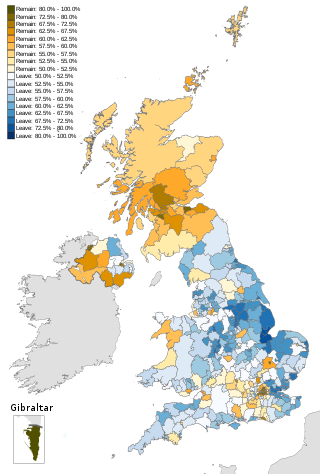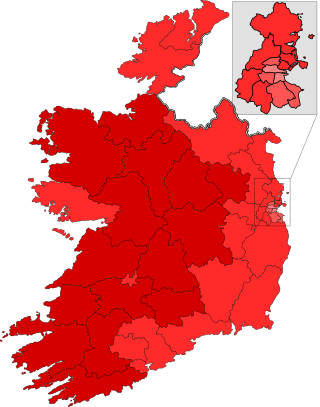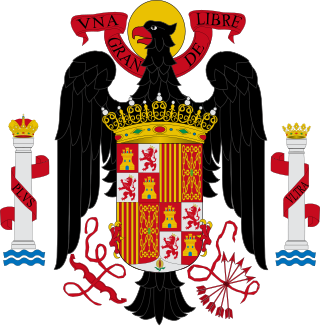
A referendum is a direct vote by the electorate on a proposal, law, or political issue. This is in contrast to an issue being voted on by a representative. This may result in the adoption of a new policy or specific law, or the referendum may be only advisory. In some countries, it is synonymous with and also known as plebiscite, votation,popular consultation, ballot question, ballot measure, or proposition.
A voting age is a minimum age established by law that a person must attain before they become eligible to vote in a public election.
The Ninth Amendment of the Constitution Act 1984 is an amendment to the Constitution of Ireland that allowed for the extension of the right to vote in elections to Dáil Éireann to non-Irish citizens. It was approved by referendum on 14 June 1984, the same day as the European Parliament election, and signed into law on 2 August of the same year.
Canada holds elections for legislatures or governments in several jurisdictions: for the federal (national) government, provincial and territorial governments, and municipal governments. Elections are also held for self-governing First Nations and for many other public and private organizations including corporations and trade unions. Municipal elections can also be held for both upper-tier and lower-tier governments.
There are three types of elections in Denmark: elections to the national parliament, local elections, and elections to the European Parliament. Referendums may also be called to consult the Danish citizenry directly on an issue of national concern.

On the federal level, there are two main elections in Austria: presidential elections and elections to determine the composition of the National Council (Nationalrat), the lower house of Austria's bicameral Parliament. The upper house, the Federal Council consists of delegates from the states and is not directly elected. These elections are governed by federal law, which also applies to European Parliament elections in Austria.

Elections in Belgium are organised for legislative bodies only, and not for executive functions. Direct elections take place for the European Parliament, the Chamber of Representatives, the Parliaments of the Regions, the Parliaments of the Communities, the provincial councils, the municipal councils and the councils of Districts of Antwerp. Voting is mandatory and all elections use proportional representation which in general requires coalition governments.

All elections in the Czech Republic are based on the principle of universal suffrage. Any adult citizen who is at least 18 years old can vote, except those who have been stripped of their legal capacities by a court, usually on the basis of mental illness. Elected representatives are elected directly by the citizens without any intermediaries. Election laws are not part of the constitution, but – unlike regular laws – they cannot be changed without the consensus of both houses of the Parliament. The Czech Republic uses a two-round plurality voting system for the presidential and Senate elections and an open party-list proportional representation system for all other elections. The proportional representation system uses the D'Hondt method for allocating seats.
A referendum on lowering the voting age from 20 to 18 was held in Denmark on 19 September 1978. It was held after the Danish government lowering the age of majority from 20 to 18 in 1976. The change was approved by 53.8% of voters with a turnout of 63.2%. The electoral age had previously been lowered from 21 to 20 in a 1971 referendum, after a 1969 referendum had rejected lowering the electoral age to 18.
A referendum on lowering the voting age from 21 to 20 was held in Denmark on 21 September 1971. The change was approved by 56.5% of voters, with a turnout of 86.2%. A previous referendum had been unsuccessful in lowering the electoral age to 18 years, which was introduced after a 1978 referendum and which still stands.
A referendum on lowering the voting age from 21 to 18 was held in Denmark on 24 June 1969. The proposed change was rejected by 78.6% of voters with a turnout of 63.6%. Two years later, the electoral age was instead lowered to 20 years, and finally, after a 1978 referendum, to 18 years.
A constitutional and electoral age referendum was held in Denmark on 28 May 1953. Both proposals were approved by voters, leading to both a new constitution taking effect on 5 June, and the electoral age being lowered from 25 to 23 years, also starting on 5 June. Voter turnout was 59.1% for the constitution question and 57.1% for the voting age question.
Electoral reform is a change in electoral systems which alters how public desires are expressed in election results.

The United Kingdom Alternative Vote referendum, also known as the UK-wide referendum on the Parliamentary voting system was held on Thursday 5 May 2011 in the United Kingdom (UK) to choose the method of electing MPs at subsequent general elections. It occurred as a provision of the Conservative–Liberal Democrat coalition agreement drawn up in 2010 and also indirectly in the aftermath of the 2009 expenses scandal. It operated under the provisions of the Parliamentary Voting System and Constituencies Act 2011 and was the first national referendum to be held under provisions laid out in the Political Parties, Elections and Referendums Act 2000.

A referendum on the military was held in Romania on 23 November 1986. Voters were asked whether they approved of reducing the size of the army and cutting military spending by 5%. According to official results, the proposals were approved by 100% of voters, with not a single vote against and only 228 registered voters not voting.
Three referendums were held in Switzerland during 1947. The first was held on 18 May on a popular initiative for "economic reform and rights concerning work", and was rejected by voters. The second and third were both held on 6 July on revising the articles of the federal constitution covering the economy and a federal law on aged and bereavement insurance. Both were approved by voters.

The 2016 United Kingdom European Union membership referendum, commonly referred to as the EU referendum or the Brexit referendum, took place on 23 June 2016 in the United Kingdom (UK) and Gibraltar to ask the electorate whether the country should remain a member of, or leave, the European Union (EU). It was organised and facilitated through the European Union Referendum Act 2015 and the Political Parties, Elections and Referendums Act 2000. The referendum resulted in 51.9% of the votes cast being in favour of leaving the EU. Although the referendum was legally non-binding, the government of the time promised to implement the result.

The Thirty-fifth Amendment of the Constitution Bill 2015 was a proposed amendment to the constitution of Ireland to reduce the minimum age of candidacy for the office of President of Ireland from 35 to 21. The bill was introduced to the Oireachtas in January 2015 by the Fine Gael–Labour government, after which both houses of the Oireachtas passed the bill. The bill was rejected by the electorate in a referendum on 22 May 2015 by 73.1% against to 26.9% in favour. This was the largest losing margin of any referendum in Ireland.

Women's suffrage in Francoist Spain and the democratic transition was constrained by age limits, definitions around heads of household and a lack of elections. Women got the right to vote in Spain in 1933 as a result of legal changes made during the Second Spanish Republic. Women lost most of their rights after Franco came to power in 1939 at the end of the Spanish Civil War, with the major exception that women did not universally lose their right to vote. Repression of the women's vote occurred nevertheless as the dictatorship held no national democratic elections between 1939 and 1977.
A constitutional referendum was held in Taiwan on 26 November 2022. Voters voted on adding Article 1-1 to the Additional Articles of the Constitution of the Republic of China. If passed, the voting age would be lowered from 20 to 18 years. The amendment would also lower the minimum age of candidacy from 23 to 18 years, but would only have an effect once the relevant electoral laws are amended accordingly.









